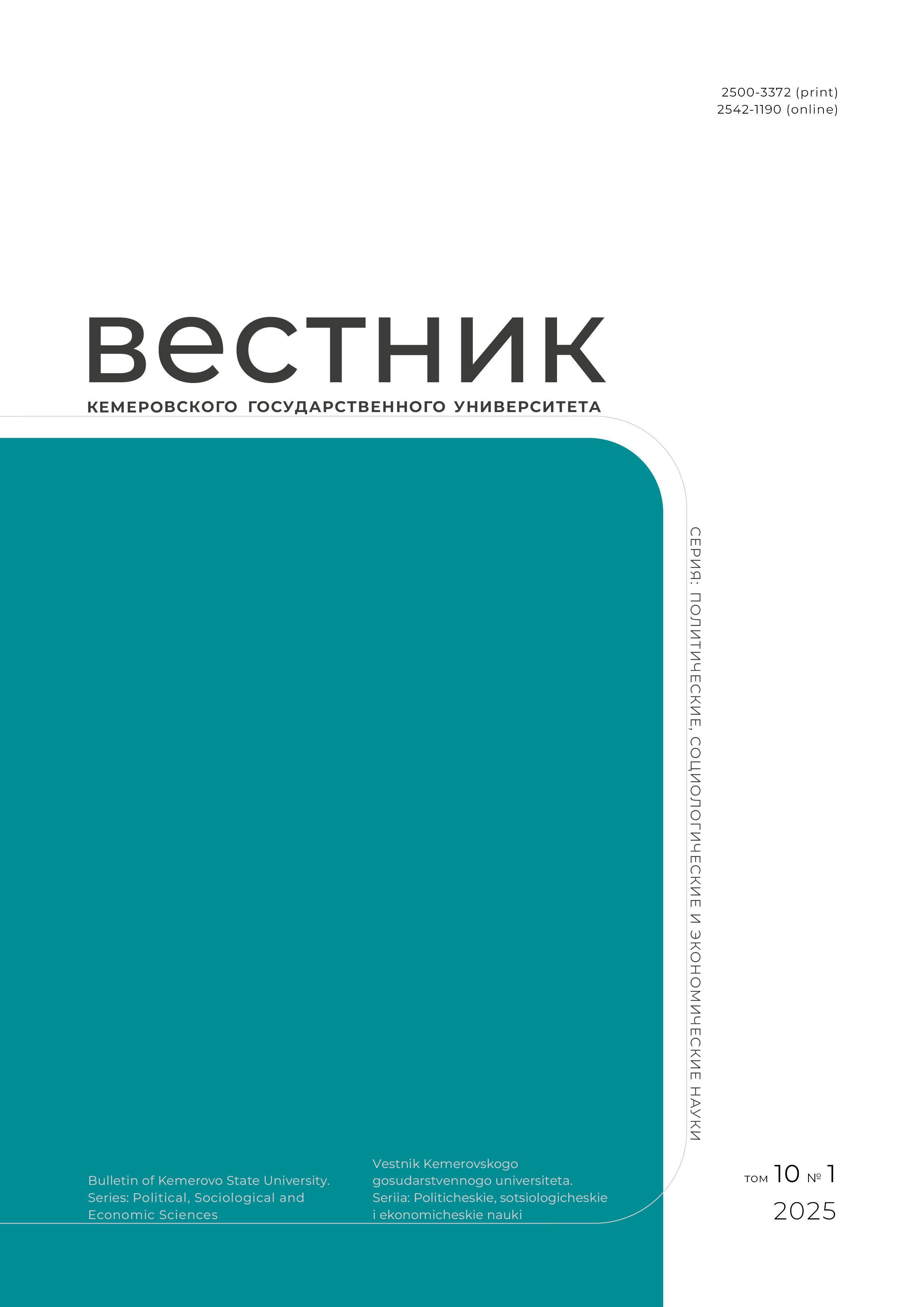employee from 01.01.2023 until now
Moscow, Moscow, Russian Federation
UDC 338.462
CSCSTI 06.71
Russian Classification of Professions by Education 38.03.01
Russian Library and Bibliographic Classification 6544
Russian Trade and Bibliographic Classification 7743
BISAC BUS016000 Consumer Behavior
Digital services, platforms, ecosystems, and social networks integrate into the service infrastructure to form a new institutional environment. The current system of formal and informal rules fails to meet this challenge. Service consumers and providers demonstrate limited rationality and opportunistic behavior that prevent them from establishing trusting relationships. The increasing costs eventually result in low efficiency and uncertainty. The paper describes is to form the conceptual framework for the institutional environment of the service infrastructure in the context of digital economy. This framework relies on a rational combination of institutions and rules that make it possible to build economic relations on the trust between the service consumer and the service provider. The resulting economic ties form a self-regulating system based on mutual trust and a combination of formal and informal rules. The author used the institutional approach to study the stages of economic development in the sphere of service infrastructure. The analysis of customer/provider interaction scenarios in the context of limited rationality and opportunistic behavior made it possible to outline the target trajectory for the development of trusting relationships in digital economy and build itsconceptual model. The model is applicable to other social spheres associated with limited rationality and opportunistic behavior.
service infrastructure, formal rules, informal rules, institutions, institutional environment, limited rationality, opportunistic behavior, behavioral attitudes, trusting relationships
1. Institutional economics. A new institutional economic theory, ed. Auzan A. A. 2nd ed. Moscow: INFRA-M, 2011, 447. (In Russ.)
2. Chausovsky A. M., Goncharova I. V., Dedukh T. M. Institutional economics: Essence, content, and functions for emerging market economies. Menedzher, 2017, (4): 104–108. (In Russ.) https://elibrary.ru/yozbqd
3. Smyshlyaev V. A., Yaresko I. I. Institutional environment of the Russian digital economy: Features of formation and development. Sovremennaia ekonomika: Problemy i resheniia, 2020, (11): 20–33. (In Russ.) https://doi.org/10.17308/meps.2020.11/2461
4. North D. Understanding the process of economic change. Moscow: HSE, 2010, 253. (In Russ.)
5. North D. Institutions, institutional changes and the functioning of the economy. Moscow: Fond ekonomicheskoi knigi "Nachala", 1997, 180. (In Russ.) https://elibrary.ru/yqdvye
6. Auzan A. A. The economy of everything. How institutions define our lives. M.: Mann, Ivanov i Ferber, 2014, 160. (In Russ.)
7. Williamson O. E. The economic institutions of capitalism. Firms, markets, relational contracting. In: Williamson O. E. Transaction cost economics. St. Petersburg: Lenizdat, 1996, chapt. 1, 48–90. (In Russ.)
8. Motovits T. G. Transformation of the institutional environment in the digital economy. Uchenye zametki TOGU, 2023, 14(3): 83–87. (In Russ.) https://elibrary.ru/vxtbgk
9. Vysotskaya N. V., Kamchatova E. Yu., Vernikov V. A. Institutional economics and innovative economic development. Moscow: State University of Management, 2022, 211. (In Russ.)
10. Fedulov D. V., Demin A. A., Demina N. K. The new institutional economics: Theory & practice. Ekonomika i predprinimatelstvo, 2019, (1): 164–168. (In Russ.) https://elibrary.ru/vvfavz
11. Shvayko A. A. Digital economy and institutional capital of a company. Modern Economy Success, 2019, (6): 117–123. (In Russ.) https://elibrary.ru/takyol
12. What is the digital economy? Problems of economic and social development, ed. Gokhberg L. M. Moscow: HSE University, 2019, 82. (In Russ.) https://elibrary.ru/dobqrf
13. Auzan A. A. Digital economy as an economy: Institutional trends. Moscow University Economic Bulletin, 2019, (6): 12–19. (In Russ.) https://doi.org/10.38050/01300105201963
14. Kolbanev M. O., Palkin I. I., Tatarnikova T. M. The challenges of the digital economy. Gidrometeorologiya i Ekologiya, 2020, (58): 156–167. (In Russ.) https://elibrary.ru/xqnnfr
15. Lapidus L. V. The digital economy challenges as the digital transformation triggers: Evolutionary scale and the cause-and-effect relationships. Intellekt. Innovacii. Investicii, 2023, (3): 11–27. (In Russ.) https://doi.org/10.25198/2077-7175-2023-3-11
16. Uskov V. S. On the issue of the Russian economy digitalization. Problems of Territory’s Development, 2020, (6): 157–175. (In Russ.) https://doi.org/10.15838/ptd.2020.6.110.10
17. Egina N. A., Balyasova A. A. Challenges and opportunities of the digital economy's institutional environment formation. Ekonomika i upravlenie: Problemy, resheniia, 2020, 2(8): 16–33. (In Russ.) https://elibrary.ru/rgvvby
18. Tambovtsev V. L. Transaction costs: Renderings and consequences. Ekonomicheskaia nauka sovremennoi Rossii, 2023, (1): 18–32. (In Russ.) https://elibrary.ru/avflse
19. Shapkin I. N., Voskresenskaya N. O. Institutional matrix of Russia in the context of globalization issues. Vek globalizatsii, 2016, (4): 100–114. (In Russ.) https://elibrary.ru/xameqj
20. Mankovsky I. A. Institutional economic theory as a theoretical basis of construction innovative economy: Modern state and development prospects. Natsionalnyi vestnik Respubliki Krym, 2022, (1): 117–129. (In Russ.) https://elibrary.ru/gznznw
21. Borovskaya L. V. Institutional environment and peculiarities of its formation as a result of institutional changes. Vestnik Voronezhskogo gosudarstvennogo universiteta. Seriia: Ekonomika i upravlenie, 2018, (4): 5–12. (In Russ.) https://elibrary.ru/yyjfet
22. Martyanov V. S. The institutional trust as an economic resource: Incentives and obstacles of efficiency. Journal of Institutional Studies, 2018, 10(1): 41–58. (In Russ.) https://doi.org/10.17835/2076-6297.2018.10.1.041-058
23. Kotliarov I. D. Transaction costs and activity of economic agents. Journal of Institutional Studies, 2017, 9(1): 69–87. (In Russ.) https://doi.org/10.17835/2076-6297.2017.9.1.069-087
24. Tambovtsev V. L. What can institutions do? Metaphors of the organizational institutionalism. Voprosy teoreticheskoy ekonomiki, 2022, (2): 22–38. (In Russ.) https://elibrary.ru/kwwans
25. Pareto V. Manual of political economy. 2nd ed. Moscow: RIOR, 2018, 592. (In Russ.)
26. Odintsova M. I. Institutional economics. 4th ed. Moscow: Iurait, 2021, 459. (In Russ.)
27. Tutov L. A., Lozina O. I. Opportunistic behavior in modern economy: Interdisciplinary approach. Public Administration. E-journal (Russia), 2019, (74): 255–272. (In Russ.) https://elibrary.ru/vihual
28. Pletnev D. A., Kozlova E. V. Opportunism as a key term of institutional economics. Bulletin of Chelyabinsk State University, 2020, (6): 28–37. (In Russ.) https://doi.org/10.47475/1994-2796-2020-10603
29. Veblen T. The theory of the leisure class. Moscow: Progress, 1984, 367. (In Russ.)
30. Williamson O. E. Behavioral prerequisites of modern economic analysis. THESIS, 1993, (3): 39–49. (In Russ.)
31. Burganov R. A. Institutional aspects of the transformation in the service sector. Kazan: Kazan. gos. energ. un-t, 2014, 200. (In Russ.) https://elibrary.ru/ylwqab

















